《咏怀古迹五首》(其三)教学设计(高一必修三)
- 格式:doc
- 大小:2.13 KB
- 文档页数:2
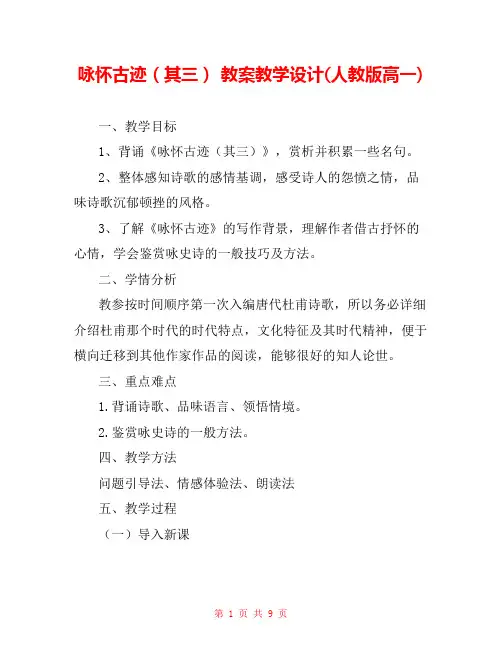
咏怀古迹(其三)教案教学设计(人教版高一)一、教学目标1、背诵《咏怀古迹(其三)》,赏析并积累一些名句。
2、整体感知诗歌的感情基调,感受诗人的怨愤之情,品味诗歌沉郁顿挫的风格。
3、了解《咏怀古迹》的写作背景,理解作者借古抒怀的心情,学会鉴赏咏史诗的一般技巧及方法。
二、学情分析教参按时间顺序第一次入编唐代杜甫诗歌,所以务必详细介绍杜甫那个时代的时代特点,文化特征及其时代精神,便于横向迁移到其他作家作品的阅读,能够很好的知人论世。
三、重点难点1.背诵诗歌、品味语言、领悟情境。
2.鉴赏咏史诗的一般方法。
四、教学方法问题引导法、情感体验法、朗读法五、教学过程(一)导入新课汉元帝年间,巴山楚水一个倾国倾城的女子,背负着民族的期望,义无反顾地踏上征途,走进了朔风劲草的茫茫大漠中,将她的一汪秋水化成一辈子的守望,种在了历史的青冢里。
唐大历年间,羁旅半生,历尽沧桑的杜甫,来到了昭君的家乡——湖北秭归。
在势若奔驰的山林间,遥想800年前的美人,杜甫会生发怎样的感想呢?今天我们将通过《咏怀古迹(其三)》这首诗去寻找答案。
(板书)(二)题解及背景介绍《咏怀古迹》是一个系列,它一共五首,每首各抒一人一事,分别为庾信、宋玉、王昭君、刘备、诸葛亮,是一组七律诗组。
与《秋兴八首》同作于大历元年的秋天。
这一年,安史之乱虽然已经结束,但国家仍然动荡不安,诗人依旧客居他乡。
吟咏古迹,追思历史人物的同时,诗人也抒发了自己一生漂泊,功业无成的感慨。
关于它的整体结构,明人王嗣奭在《杜臆》中有很好的解释:“怀庾信、宋玉,以斯文为己任也;怀先主、武侯,叹君臣际会之难逢也;中间昭君一章,盖入宫见妒,与入朝见妒者,千古有同感焉。
”(三)学生齐读诗歌品味诗歌,体会情感;教师正音。
(省 xing)(四)诗歌大意群山万壑随着险急的江流,奔赴荆门山,这里有生长明妃(王昭君)的村子。
一旦离开汉宫,(命运)便与北方少数民族相连,独留下青冢向着黄昏。
凭着画工画的画像只能约略认识昭君美丽的面容,空有她那怀念故国的魂魄月夜归来。
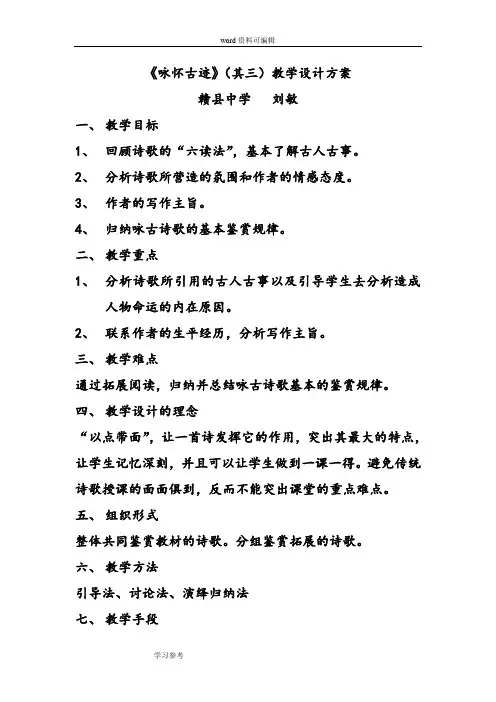
《咏怀古迹》(其三)教学设计方案赣县中学刘敏一、教学目标1、回顾诗歌的“六读法”,基本了解古人古事。
2、分析诗歌所营造的氛围和作者的情感态度。
3、作者的写作主旨。
4、归纳咏古诗歌的基本鉴赏规律。
二、教学重点1、分析诗歌所引用的古人古事以及引导学生去分析造成人物命运的内在原因。
2、联系作者的生平经历,分析写作主旨。
三、教学难点通过拓展阅读,归纳并总结咏古诗歌基本的鉴赏规律。
四、教学设计的理念“以点带面”,让一首诗发挥它的作用,突出其最大的特点,让学生记忆深刻,并且可以让学生做到一课一得。
避免传统诗歌授课的面面俱到,反而不能突出课堂的重点难点。
五、组织形式整体共同鉴赏教材的诗歌。
分组鉴赏拓展的诗歌。
六、教学方法引导法、讨论法、演绎归纳法七、教学手段通过活动的小黑板展示拓展诗歌,通过大黑板板书归纳内容。
八、教学基本思路1、引导学生通过巩固诗歌的“六读法”,剖析本诗。
感受意境,体会作者寄寓的情感,明了作者的写作主旨。
2、拓展阅读,例举三首咏古诗进行对比、综合鉴赏。
3、学生分组进行讨论和探究,进一步探求鉴赏怀古诗的基本规律,教师进行适当地点拨。
4、师生共同完成对规律的表述。
九、教学步骤和教学内容(一)文本解读1、导入。
由“美”切入。
生活中并不是缺少美,而是缺少一双发现的眼睛。
自古就是“爱美之心,人皆有之”。
所有美好的人与事或物总能让赏心悦目,心生留恋。
可是并不是所有一切美好的东西都会有一个完美的归宿。
因而千百年来总有无数为美好的东西而心生遗憾。
今天,我们将与杜甫一起去见证“美”感受杜甫的心情。
2、反复诵读3、通过“诗歌六读法”基本步骤,进入对文本的解读。
①读标题咏怀古迹提问:咏的是什么情怀?观瞻的是关于什么的古迹?全诗所营造的氛围是怎样的?②带着问题进入文本,进行自读。
要求从文本中找出相应的相关词语进行回答。
(提示:读作者、读意象、读意象的修饰词、读情感词、读注释)③具体读:作者:坎坷一生、怀才不遇意象:群山、万壑、荆门、明妃、紫台、朔漠、青冢、黄昏、夜月魂、琵琶等意象的修饰词:独、空情感词:怨恨④由此可以整体感知:古迹是关于明妃,即王昭君,青冢可以作证。
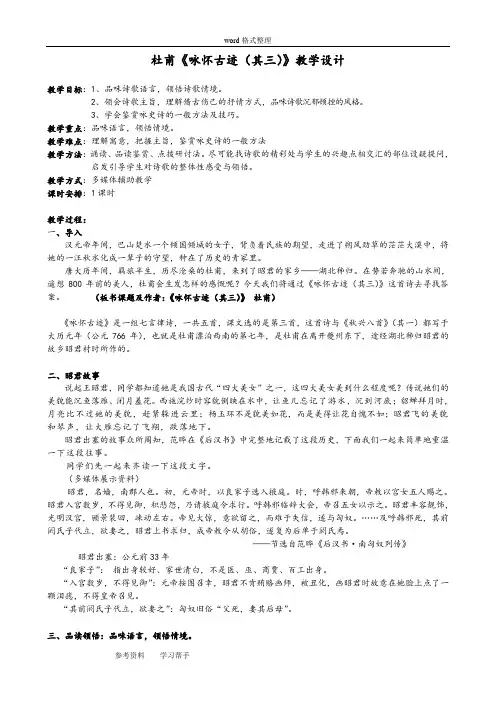
杜甫《咏怀古迹(其三)》教学设计教学目标:1、品味诗歌语言,领悟诗歌情境。
2、领会诗歌主旨,理解借古伤己的抒情方式,品味诗歌沉郁顿挫的风格。
3、学会鉴赏咏史诗的一般方法及技巧。
教学重点:品味语言,领悟情境。
教学难点:理解寓意,把握主旨,鉴赏咏史诗的一般方法教学方法:诵读、品读鉴赏、点拨研讨法。
尽可能找诗歌的精彩处与学生的兴趣点相交汇的部位设疑提问,启发引导学生对诗歌的整体性感受与领悟。
教学方式:多媒体辅助教学课时安排:1课时教学过程:一、导入汉元帝年间,巴山楚水一个倾国倾城的女子,背负着民族的期望,走进了朔风劲草的茫茫大漠中,将她的一汪秋水化成一辈子的守望,种在了历史的青冢里。
唐大历年间,羁旅半生,历尽沧桑的杜甫,来到了昭君的家乡——湖北秭归。
在势若奔驰的山水间,遥想800年前的美人,杜甫会生发怎样的感慨呢?今天我们将通过《咏怀古迹(其三)》这首诗去寻找答案。
(板书课题及作者:《咏怀古迹(其三)》杜甫)《咏怀古迹》是一组七言律诗,一共五首,课文选的是第三首,这首诗与《秋兴八首》(其一)都写于大历元年(公元766年),也就是杜甫漂泊西南的第七年,是杜甫在离开夔州东下,途经湖北秭归昭君的故乡昭君村时所作的。
二、昭君故事说起王昭君,同学都知道她是我国古代“四大美女”之一,这四大美女美到什么程度呢?传说她们的美貌能沉鱼落雁、闭月羞花。
西施浣纱时容貌倒映在水中,让鱼儿忘记了游水,沉到河底;貂蝉拜月时,月亮比不过她的美貌,赶紧躲进云里;杨玉环不是貌美如花,而是美得让花自愧不如;昭君飞的美貌和琴声,让大雁忘记了飞翔,跌落地下。
昭君出塞的故事众所周知,范晔在《后汉书》中完整地记载了这段历史,下面我们一起来简单地重温一下这段往事。
同学们先一起来齐读一下这段文字。
(多媒体展示资料)昭君,名嫱,南郡人也。
初,元帝时,以良家子选入掖庭。
时,呼韩邪来朝,帝敕以宫女五人赐之。
昭君入宫数岁,不得见御,积悲怨,乃请掖庭令求行。
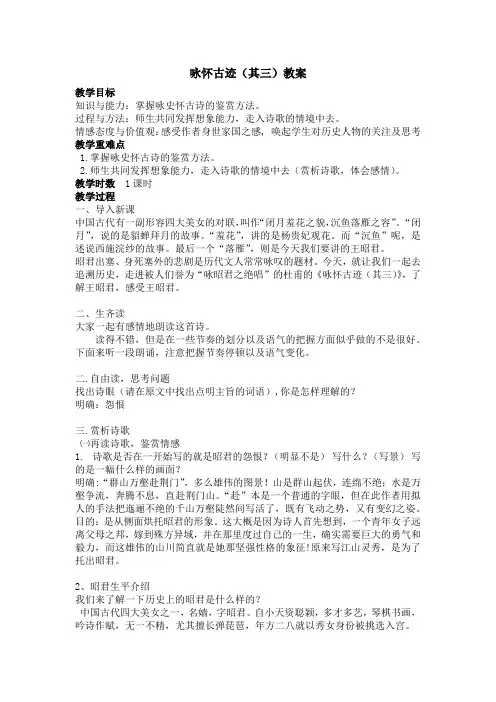
咏怀古迹(其三)教案教学目标知识与能力:掌握咏史怀古诗的鉴赏方法。
过程与方法:师生共同发挥想象能力,走入诗歌的情境中去。
情感态度与价值观:感受作者身世家国之感, 唤起学生对历史人物的关注及思考教学重难点1.掌握咏史怀古诗的鉴赏方法。
2.师生共同发挥想象能力,走入诗歌的情境中去(赏析诗歌,体会感情)。
教学时数 1课时教学过程一、导入新课中国古代有一副形容四大美女的对联,叫作“闭月羞花之貌,沉鱼落雁之容”。
“闭月”,说的是貂蝉拜月的故事。
“羞花”,讲的是杨贵妃观花。
而“沉鱼”呢,是述说西施浣纱的故事。
最后一个“落雁”,则是今天我们要讲的王昭君。
昭君出塞、身死塞外的悲剧是历代文人常常咏叹的题材。
今天,就让我们一起去追溯历史,走进被人们誉为“咏昭君之绝唱”的杜甫的《咏怀古迹(其三)》,了解王昭君,感受王昭君。
二、生齐读大家一起有感情地朗读这首诗。
读得不错,但是在一些节奏的划分以及语气的把握方面似乎做的不是很好。
下面来听一段朗诵,注意把握节奏停顿以及语气变化。
二.自由读,思考问题找出诗眼(请在原文中找出点明主旨的词语),你是怎样理解的?明确:怨恨三.赏析诗歌㈠再读诗歌,鉴赏情感1. 诗歌是否在一开始写的就是昭君的怨恨?(明显不是)写什么?(写景)写的是一幅什么样的画面?明确:“群山万壑赴荆门”,多么雄伟的图景!山是群山起伏,连绵不绝;水是万壑争流,奔腾不息,直赴荆门山。
“赴”本是一个普通的字眼,但在此作者用拟人的手法把迤逦不绝的千山万壑陡然间写活了,既有飞动之势,又有变幻之姿。
目的:是从侧面烘托昭君的形象。
这大概是因为诗人首先想到,一个青年女子远离父母之邦,嫁到殊方异域,并在那里度过自己的一生,确实需要巨大的勇气和毅力,而这雄伟的山川简直就是她那坚强性格的象征!原来写江山灵秀,是为了托出昭君。
2、昭君生平介绍我们来了解一下历史上的昭君是什么样的?中国古代四大美女之一,名嫱,字昭君。
自小天资聪颖,多才多艺,琴棋书画,吟诗作赋,无一不精,尤其擅长弹琵琶,年方二八就以秀女身份被挑选入宫。
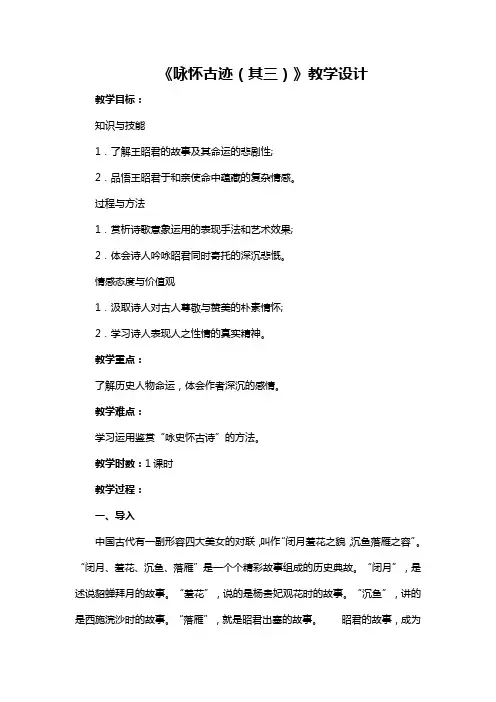
《咏怀古迹(其三)》教学设计教学目标:知识与技能1.了解王昭君的故事及其命运的悲剧性;2.品悟王昭君于和亲使命中蕴藏的复杂情感。
过程与方法1.赏析诗歌意象运用的表现手法和艺术效果;2.体会诗人吟咏昭君同时寄托的深沉悲慨。
情感态度与价值观1.汲取诗人对古人尊敬与赞美的朴素情怀;2.学习诗人表现人之性情的真实精神。
教学重点:了解历史人物命运,体会作者深沉的感情。
教学难点:学习运用鉴赏“咏史怀古诗”的方法。
教学时数:1课时教学过程:一、导入中国古代有一副形容四大美女的对联,叫作“闭月羞花之貌,沉鱼落雁之容”。
“闭月、羞花、沉鱼、落雁”是一个个精彩故事组成的历史典故。
“闭月”,是述说貂蝉拜月的故事。
“羞花”,说的是杨贵妃观花时的故事。
“沉鱼”,讲的是西施浣沙时的故事。
“落雁”,就是昭君出塞的故事。
昭君的故事,成为我国历史上流传不衰的民族团结的佳话,同时,昭君出塞、身死塞外的悲剧是历代文人常常咏叹的题材。
今天,就让我们一起去追溯历史,走进被人们誉为“咏昭君之绝唱”的杜甫的《咏怀古迹(其三)》,了解王昭君,感受王昭君。
二、知识链接1.背景补充唐玄宗天宝五年(746年),西入长安,羁留十年,才做了个看管兵甲器杖的小官。
安史之乱爆发,前往灵武投奔唐肃宗,任右拾遗。
因上疏救宰相房王官触怒唐肃宗而受排挤遭贬,被贬为华州司功参军。
自己一片赤诚,尽忠进谏,皇帝却不分忠佞,无辜贬斥自己,当然怨恨,但又不能明说。
这个时候,安史之乱虽然已经结束,但国家仍然动荡不安,诗人依旧客居他乡。
2.诗题介绍咏怀古迹五首是一组七言律诗,这五首诗是诗人游江陵、夔州一带,访庾信故居、宋玉宅、昭君村、蜀先主庙、武侯祠,因古迹怀古人并自我伤感而作,一气贯成,为一组诗。
吟咏古迹,追思历史人物的同时,诗人也抒发了自己一生漂泊,功业无成的感慨。
第一首写庾信。
诗人一直是赞美庾信的,诗中由庾的遭遇联系起自己的境况。
第二首写屈原弟子宋玉,既表明诗人崇拜他的词章,又深感同样的悲凉寂寞,感慨中对国运的兴衰怀有讽喻。
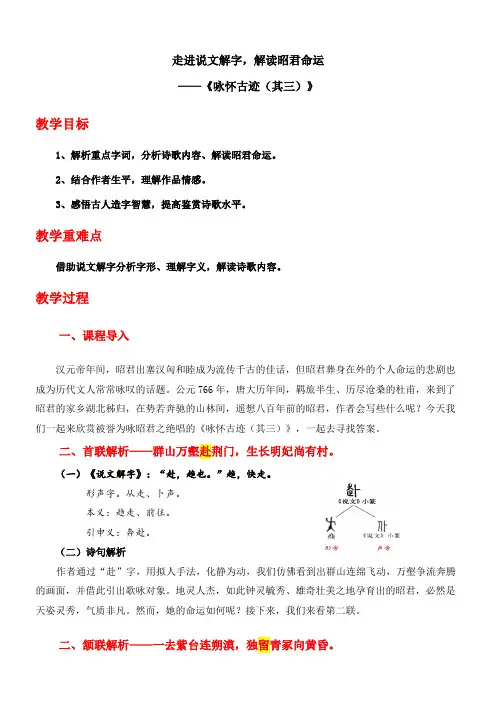
走进说文解字,解读昭君命运——《咏怀古迹(其三)》教学目标1、解析重点字词,分析诗歌内容、解读昭君命运。
2、结合作者生平,理解作品情感。
3、感悟古人造字智慧,提高鉴赏诗歌水平。
教学重难点借助说文解字分析字形、理解字义,解读诗歌内容。
教学过程一、课程导入汉元帝年间,昭君出塞汉匈和睦成为流传千古的佳话,但昭君葬身在外的个人命运的悲剧也成为历代文人常常咏叹的话题。
公元766年,唐大历年间,羁旅半生、历尽沧桑的杜甫,来到了昭君的家乡湖北秭归,在势若奔驰的山林间,遥想八百年前的昭君,作者会写些什么呢?今天我们一起来欣赏被誉为咏昭君之绝唱的《咏怀古迹(其三)》,一起去寻找答案。
二、首联解析——群山万壑赴荆门,生长明妃尚有村。
(一)《说文解字》:“赴,趋也。
”趋,快走。
形声字。
从走、卜声。
本义:趋走、前往。
引申义:奔赴。
(二)诗句解析作者通过“赴”字,用拟人手法,化静为动,我们仿佛看到出群山连绵飞动,万壑争流奔腾的画面,并借此引出歌咏对象。
地灵人杰,如此钟灵毓秀、雄奇壮美之地孕育出的昭君,必然是天姿灵秀,气质非凡。
然而,她的命运如何呢?接下来,我们来看第二联。
二、颔联解析——一去紫台连朔漠,独留青冢向黄昏。
(一)《说文解字》:“畱(留),止也。
从田,丣聲。
”以田字为形旁,表示停留的地方丣字像田边蜿蜒的沟渠,为水流停留于田间之意。
意为:停留、停止(二)诗句解析“留”字照应上文“去”,昭君告别了故土,登程北去。
一路上,草木萋萋、马嘶雁鸣,黄沙漫卷、西风烈烈,回首望故乡渺渺、悲戚难抑。
原想此去经年、归期有盼,不料这一去,便是天涯路远、再难相见,最终她带着一生的思念,魂断朔漠,只剩荒冢一堆永远地停留在了异域他乡。
三、颈联解析——画图省识春风面,环珮空归月夜魂。
(一)《说文解字》:“空,窍也。
”窍,窟窿。
“穴”是形旁,指示字义,洞穴、洞窟。
象形,其形像挖洞穴居,上面像隆起,两侧像边缘,中间像挖空的痕迹。
“窍”本义:孔穴;引申义:没有什么内容,抽象为空洞无物;进而由空洞虚化为副词,表示徒然、白白地。
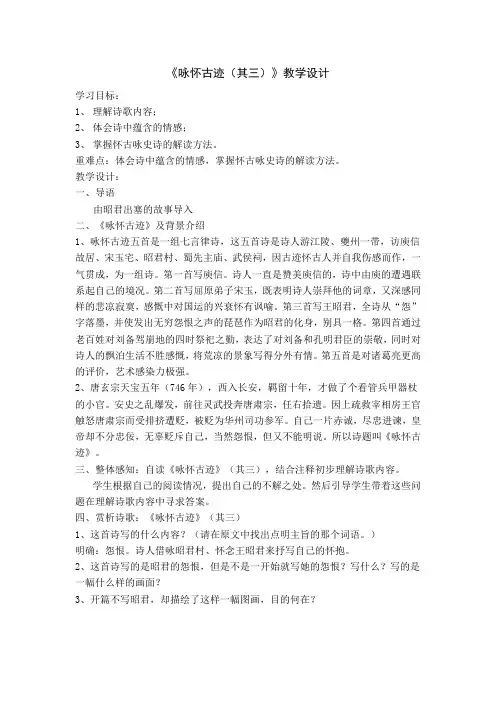
《咏怀古迹(其三)》教学设计学习目标:1、理解诗歌内容;2、体会诗中蕴含的情感;3、掌握怀古咏史诗的解读方法。
重难点:体会诗中蕴含的情感,掌握怀古咏史诗的解读方法。
教学设计:一、导语由昭君出塞的故事导入二、《咏怀古迹》及背景介绍1、咏怀古迹五首是一组七言律诗,这五首诗是诗人游江陵、夔州一带,访庾信故居、宋玉宅、昭君村、蜀先主庙、武侯祠,因古迹怀古人并自我伤感而作,一气贯成,为一组诗。
第一首写庾信。
诗人一直是赞美庾信的,诗中由庾的遭遇联系起自己的境况。
第二首写屈原弟子宋玉,既表明诗人崇拜他的词章,又深感同样的悲凉寂寞,感慨中对国运的兴衰怀有讽喻。
第三首写王昭君,全诗从“怨”字落墨,并使发出无穷怨恨之声的琵琶作为昭君的化身,别具一格。
第四首通过老百姓对刘备驾崩地的四时祭祀之勤,表达了对刘备和孔明君臣的崇敬,同时对诗人的飘泊生活不胜感慨,将荒凉的景象写得分外有情。
第五首是对诸葛亮更高的评价,艺术感染力极强。
2、唐玄宗天宝五年(746年),西入长安,羁留十年,才做了个看管兵甲器杖的小官。
安史之乱爆发,前往灵武投奔唐肃宗,任右拾遗。
因上疏救宰相房王官触怒唐肃宗而受排挤遭贬,被贬为华州司功参军。
自己一片赤诚,尽忠进谏,皇帝却不分忠佞,无辜贬斥自己,当然怨恨,但又不能明说。
所以诗题叫《咏怀古迹》。
三、整体感知:自读《咏怀古迹》(其三),结合注释初步理解诗歌内容。
学生根据自己的阅读情况,提出自己的不解之处。
然后引导学生带着这些问题在理解诗歌内容中寻求答案。
四、赏析诗歌:《咏怀古迹》(其三)1、这首诗写的什么内容?(请在原文中找出点明主旨的那个词语。
)明确:怨恨。
诗人借咏昭君村、怀念王昭君来抒写自己的怀抱。
2、这首诗写的是昭君的怨恨,但是不是一开始就写她的怨恨?写什么?写的是一幅什么样的画面?3、开篇不写昭君,却描绘了这样一幅图画,目的何在?明确:引出歌咏对象昭君。
这是从侧面烘托昭君的形象。
这大概是因为诗人首先想到,一个青年女子远离父母之邦,嫁到殊方异域,并在那里度过自己的一生,确实需要巨大的勇气和毅力,而这雄伟的山川简直就是她那坚强性格的象征!4、【小组讨论】(1)明代评论家胡震亨认为,这么气象雄伟的起句,只有用在生长英雄的地方才适当,用在昭君村上是不适合、不协调的。
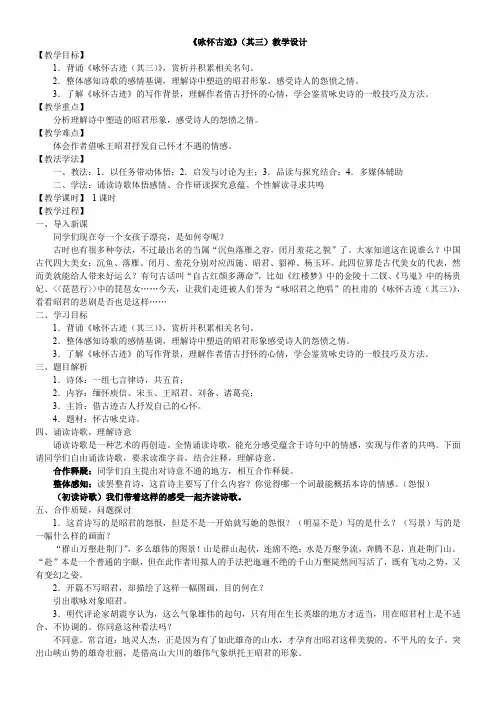
《咏怀古迹》(其三)教学设计【教学目标】1.背诵《咏怀古迹(其三)》,赏析并积累相关名句。
2.整体感知诗歌的感情基调,理解诗中塑造的昭君形象,感受诗人的怨愤之情。
3.了解《咏怀古迹》的写作背景,理解作者借古抒怀的心情,学会鉴赏咏史诗的一般技巧及方法。
【教学重点】分析理解诗中塑造的昭君形象,感受诗人的怨愤之情。
【教学难点】体会作者借咏王昭君抒发自己怀才不遇的情感。
【教法学法】一、教法:1.以任务带动体悟;2.启发与讨论为主;3.品读与探究结合;4.多媒体辅助二、学法:诵读诗歌体悟感情、合作研读探究意蕴、个性解读寻求共鸣【教学课时】1课时【教学过程】一、导入新课同学们现在夸一个女孩子漂亮,是如何夸呢?古时也有很多种夸法,不过最出名的当属“沉鱼落雁之容,闭月羞花之貌”了。
大家知道这在说谁么?中国古代四大美女:沉鱼、落雁、闭月、羞花分别对应西施、昭君、貂禅、杨玉环。
此四位算是古代美女的代表,然而美就能给人带来好运么?有句古话叫“自古红颜多薄命”,比如《红楼梦》中的金陵十二钗、《马嵬》中的杨贵妃、<<琵琶行>>中的琵琶女……今天,让我们走进被人们誉为“咏昭君之绝唱”的杜甫的《咏怀古迹(其三)》,看看昭君的悲剧是否也是这样……二、学习目标1.背诵《咏怀古迹(其三)》,赏析并积累相关名句。
2.整体感知诗歌的感情基调,理解诗中塑造的昭君形象感受诗人的怨愤之情。
3.了解《咏怀古迹》的写作背景,理解作者借古抒怀的心情,学会鉴赏咏史诗的一般技巧及方法。
三、题目解析1.诗体:一组七言律诗,共五首;2.内容:缅怀庾信、宋玉、王昭君、刘备、诸葛亮;3.主旨:借古迹古人抒发自己的心怀。
4.题材:怀古咏史诗。
四、诵读诗歌,理解诗意诵读诗歌是一种艺术的再创造。
全情诵读诗歌,能充分感受蕴含于诗句中的情感,实现与作者的共鸣。
下面请同学们自由诵读诗歌,要求读准字音,结合注释,理解诗意。
合作释疑:同学们自主提出对诗意不通的地方,相互合作释疑。
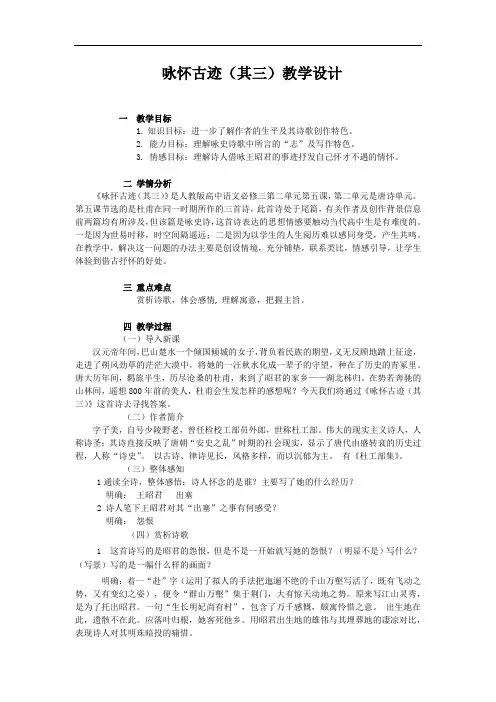
咏怀古迹(其三)教学设计一教学目标1. 知识目标:进一步了解作者的生平及其诗歌创作特色。
2. 能力目标:理解咏史诗歌中所言的“志”及写作特色。
3. 情感目标:理解诗人借咏王昭君的事迹抒发自己怀才不遇的情怀。
二学情分析《咏怀古迹(其三)》是人教版高中语文必修三第二单元第五课,第二单元是唐诗单元。
第五课节选的是杜甫在同一时期所作的三首诗,此首诗处于尾篇,有关作者及创作背景信息前两篇均有所涉及,但该篇是咏史诗,这首诗表达的思想情感要触动当代高中生是有难度的。
一是因为世易时移,时空间隔遥远;二是因为以学生的人生阅历难以感同身受,产生共鸣。
在教学中,解决这一问题的办法主要是创设情境,充分铺垫,联系类比,情感引导,让学生体验到借古抒怀的好处。
三重点难点赏析诗歌,体会感情, 理解寓意,把握主旨。
四教学过程(一)导入新课汉元帝年间,巴山楚水一个倾国倾城的女子,背负着民族的期望,义无反顾地踏上征途,走进了朔风劲草的茫茫大漠中,将她的一汪秋水化成一辈子的守望,种在了历史的青冢里。
唐大历年间,羁旅半生,历尽沧桑的杜甫,来到了昭君的家乡——湖北秭归。
在势若奔驰的山林间,遥想800年前的美人,杜甫会生发怎样的感想呢?今天我们将通过《咏怀古迹(其三)》这首诗去寻找答案。
(二)作者简介字子美,自号少陵野老,曾任检校工部员外郎,世称杜工部。
伟大的现实主义诗人,人称诗圣;其诗直接反映了唐朝“安史之乱”时期的社会现实,显示了唐代由盛转衰的历史过程,人称“诗史”。
以古诗、律诗见长,风格多样,而以沉郁为主。
有《杜工部集》。
(三)整体感知1通读全诗,整体感悟:诗人怀念的是谁?主要写了她的什么经历?明确:王昭君出塞2 诗人笔下王昭君对其“出塞”之事有何感受?明确:怨恨(四)赏析诗歌1 这首诗写的是昭君的怨恨,但是不是一开始就写她的怨恨?(明显不是)写什么?(写景)写的是一幅什么样的画面?明确:着一“赴”字(运用了拟人的手法把迤逦不绝的千山万壑写活了,既有飞动之势,又有变幻之姿),便令“群山万壑”集于荆门,大有惊天动地之势。
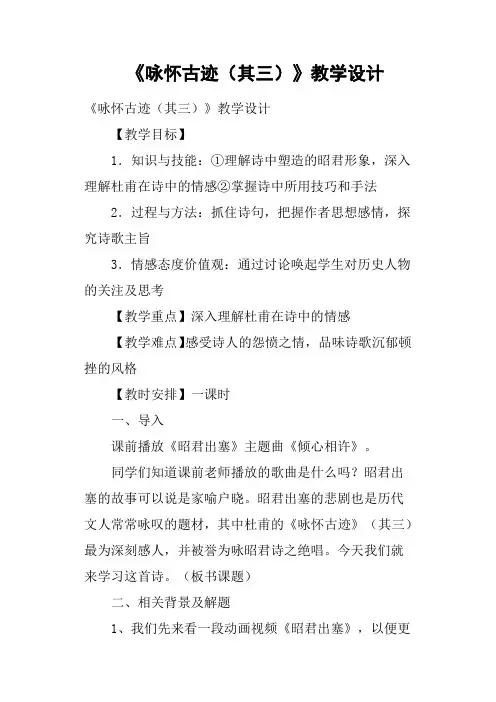
《咏怀古迹(其三)》教学设计《咏怀古迹(其三)》教学设计【教学目标】1.知识与技能:①理解诗中塑造的昭君形象,深入理解杜甫在诗中的情感②掌握诗中所用技巧和手法2.过程与方法:抓住诗句,把握作者思想感情,探究诗歌主旨3.情感态度价值观:通过讨论唤起学生对历史人物的关注及思考【教学重点】深入理解杜甫在诗中的情感【教学难点】感受诗人的怨愤之情,品味诗歌沉郁顿挫的风格【教时安排】一课时一、导入课前播放《昭君出塞》主题曲《倾心相许》。
同学们知道课前老师播放的歌曲是什么吗?昭君出塞的故事可以说是家喻户晓。
昭君出塞的悲剧也是历代文人常常咏叹的题材,其中杜甫的《咏怀古迹》(其三)最为深刻感人,并被誉为咏昭君诗之绝唱。
今天我们就来学习这首诗。
(板书课题)二、相关背景及解题1、我们先来看一段动画视频《昭君出塞》,以便更好地了解一下这首诗。
2、解题接下来看一段名人介绍《咏怀古迹》的视频。
三、美读诗、听视频朗读,感受诗歌的情感基调(课件:视频朗读)要求:A多媒体播放朗读,让学生注意朗读语调和情感,并与自己课前试读对比一下,找出自己的不足。
B 明确诗歌的情感基调明确:诗歌基调:沉郁怨愤。
2、学生自由朗读要求:A、学生自由读,一边朗读,揣摩作者的感情B、结合课下注释理解诗文大意,并找出本诗的诗眼。
(怨恨)C、指名学生朗读,同学点评3、学生个别读。
(何宇、陈玲)(黄玲玲)(课件:视频朗读)四、合作探究、品味情感,归纳主旨讨论:昭君有何怨恨?为什么怨恨?你是从那些诗句中读到的?(出示课件)预设:【生1:我认为她怨画师。
因为画工把她画丑了,让她见不到皇帝。
生2:她一个人孤零零地远嫁匈奴,想回家却不能回家。
师:嗯,很好。
谁还有吗?生3:老师,我认为她也怨恨皇帝。
其实她心里很明白,一个小小的画师怎么会有那么大胆,还不是皇帝昏庸,才导致了她的悲剧。
生4:老师,我看过史书说昭君远嫁匈奴以后,非常思念故乡,然而多次上书希望回故乡看看,都未能如愿。
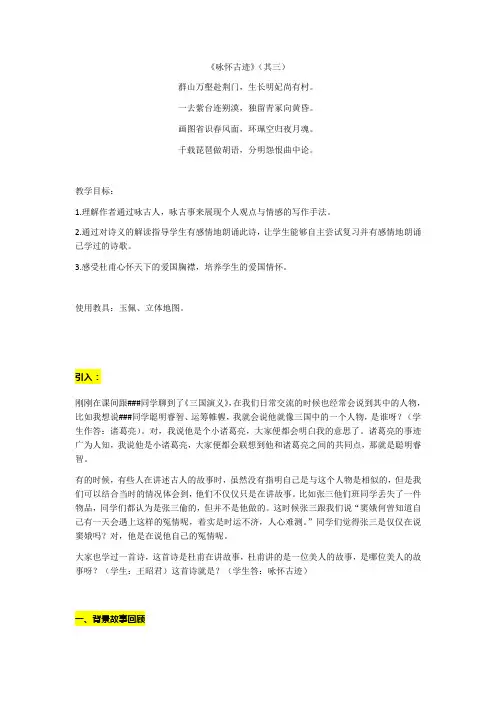
《咏怀古迹》(其三)群山万壑赴荆门,生长明妃尚有村。
一去紫台连朔漠,独留青冢向黄昏。
画图省识春风面,环珮空归夜月魂。
千载琵琶做胡语,分明怨恨曲中论。
教学目标:1.理解作者通过咏古人,咏古事来展现个人观点与情感的写作手法。
2.通过对诗义的解读指导学生有感情地朗诵此诗,让学生能够自主尝试复习并有感情地朗诵已学过的诗歌。
3.感受杜甫心怀天下的爱国胸襟,培养学生的爱国情怀。
使用教具:玉佩、立体地图。
引入:刚刚在课间跟###同学聊到了《三国演义》,在我们日常交流的时候也经常会说到其中的人物,比如我想说###同学聪明睿智、运筹帷幄,我就会说他就像三国中的一个人物,是谁呀?(学生作答:诸葛亮)。
对,我说他是个小诸葛亮,大家便都会明白我的意思了。
诸葛亮的事迹广为人知,我说他是小诸葛亮,大家便都会联想到他和诸葛亮之间的共同点,那就是聪明睿智。
有的时候,有些人在讲述古人的故事时,虽然没有指明自己是与这个人物是相似的,但是我们可以结合当时的情况体会到,他们不仅仅只是在讲故事。
比如张三他们班同学丢失了一件物品,同学们都认为是张三偷的,但并不是他做的。
这时候张三跟我们说“窦娥何曾知道自己有一天会遇上这样的冤情呢,着实是时运不济,人心难测。
”同学们觉得张三是仅仅在说窦娥吗?对,他是在说他自己的冤情呢。
大家也学过一首诗,这首诗是杜甫在讲故事,杜甫讲的是一位美人的故事,是哪位美人的故事呀?(学生:王昭君)这首诗就是?(学生答:咏怀古迹)一、背景故事回顾这首诗大家已经学过了,应该大概也了解了王昭君的故事了吧?我看有的同学似乎有点记不清了啊,那请唐##同学来为我们讲一下这个故事吧。
学生讲述到以下几个点即可:选为宫女,画图丑化,不得宠幸,出嫁匈奴,未能归汉。
故事简介:王昭君出生于秭归(如今的湖北宜昌)的平民家庭,在16岁时被选入宫廷成为宫女,据《西京杂记》记载,汉元帝因后宫女子众多,就叫画工给这些女子画像,自己根据这些画像来选人召幸,一般人都为了获得宠爱而贿赂画师,让画师把自己画的美丽一些。
《咏怀古迹》(其三)教学设计 教学目标: 一、知识与能力 1、理解诗歌内容,把握王昭君的形象,掌握本诗的艺术手法; 2、了解咏史怀古诗的特点,并掌握鉴赏的方法。 二、过程与能力 1、运用诵读法、讨论法,在学生理解诗歌内容的基础上,讨论归纳王昭君形象,进而探究这首诗歌的主旨,把握作者的情感。 2、通过对诗歌的解读,让学生掌握咏史怀古诗的特点及鉴赏方法。 三、情感态度与价值观 通过学习,感受本诗的艺术魅力,唤起学生对历史人物的关注与思考;体会诗人博大的情怀。 教学重点、难点: 1、 理解诗歌内容,把握王昭君的形象,掌握本诗的艺术手法; 2、 讨论归纳王昭君形象,进而探究这首诗歌的主旨,把握作者的情感。 学情分析: 《咏怀古迹五首(其三)》选自人教版必修三第二单元《杜甫诗三首》。这是诗人游江陵、夔州一带,访庾信故居、宋玉宅、昭君村、蜀先主庙、武侯祠,因古迹怀古人并自我伤感而作的一组七言律诗中的一首。我所带的学生层次相对较高,通过对必修和必修二诗歌的学习,孩子对诗歌的鉴赏方法有了一些基本的了解,通过朗读也能基本把握诗歌的大致内容,但是对诗歌的艺术手法的运用和怀古诗的鉴赏技巧还需要老师进行引导。 教学方法:朗读法 、讨论合作探究法 教学准备:多媒体课件 教学安排:一课时
教学过程: 一、导入 汉元帝年间,巴山楚水一个倾国倾城的女子,背负着民族的期望,义无反顾地踏上征途,走进了朔风劲草的茫茫大漠中,将她的一汪秋水化成一辈子的守望,种在了历史的青冢里。她就是有沉鱼落雁之貌的王昭君。唐大历年间,羁旅半生,历尽沧桑的杜甫,来到了昭君的家乡——湖北秭归。在势若奔驰的山林间,遥想800年前的美人,杜甫会生发怎样的感呢?今天我们将通过《咏怀古迹(其三)》这首诗去寻找答案。(板书) 二、题解 标题《咏怀古迹》,即这是一首“咏史怀古诗”。咏史怀古诗是我国古代诗歌中重要的一类,诗人读史或游览古迹时,有感于历史遗迹、历史事件、历史人物,抒发对生活、时事、自身的感慨。通过预习,大家已经知道本首咏史怀古诗是对------进行吟咏来寄托个人怀抱的?(王昭君)。大家再看题目,后面有个“其三”,说明《咏怀古迹》不是一首诗,它是一组七律诗组,一共五首,每首各抒一人一事,分别为庾信、宋玉、王昭君、刘备、诸葛亮。 三、整体感知。 1、朗读。 2、再读,把握诗歌大意:
教学目标
1.知识与技能:
①理解诗中塑造的昭君形象;
②掌握诗中所用技艺和手法;
2.过程与方法
诵读法、讨论法、围绕中心分析细节材料法;
3.情感态度价值观
品味诗人杜甫在诗中的情感,探讨如何正确对待挫折。
教学重点、难点
1.理解王昭君的形象(重点)
2.深入理解杜甫在诗中的情感(难点)
教时安排:
二课时
教学过程:
第一课时
一、导入新课:
昭君出塞、身死异国的悲剧是历代文人常常咏叹的题材。从西晋的石崇开始,到南北朝的鲍
照、庾信,再到唐代的李白、杜甫、白居易,都写过咏昭君的诗,其中杜甫的《咏怀古迹(其
三)》最为深刻感人,并被誉为咏昭君诗之绝唱。尽管柔柔弱弱的王昭君,没有叱咤风云,没
有威风凛凛,然而诗歌那苍凉悲壮的意境,仍能使我们强烈地感受到那段凄婉哀怨的历史。
今天,就让我们一起去追溯历史,走进杜甫的《咏怀古迹》,感受王昭君这一形象永恒的艺术
魅力。
二、朗读及整体感知:
1、诗体:从标题我们应该猜得出来,《咏怀古迹》是一个系列,它一共五首七言律诗;
2、内容:每首各抒一人一事,分别缅怀庾信、宋玉、王昭君、刘备、诸葛亮;
3、主旨:这组诗与《秋兴八首》同作于大历元年的秋天,昨天我们已经讲到,这一年,安史
之乱虽然已经结束,但国家仍然动荡不安,诗人依旧客居他乡。是借古迹古人抒发自己的心
怀,在吟咏古迹,追思历史人物的同时,诗人抒发了自己一生漂泊,功业无成的感慨。
4、听示范朗诵,学生认真品味诗歌情感。
三、解析诗文:
首联:群山万壑赴荆门,生长明妃尚有村。(点明出生地:昭君村)
1.释“壑”“赴”“荆门”“尚”“明妃”。
“壑”:山谷,山沟。
“赴”:奔向,投向。
“荆门”:山名,位于湖北枝城市西北,东眺武汉,西临三峡,南望潇湘,北通川陕,素有“荆楚
门户”之称。
“尚”:还有。
“明妃”:王昭君,西晋时因避晋文帝司马昭讳,改为明君、明妃。
2.赏析“赴”字之妙。
诗人由近及远,构想出群山万壑随着险急的江流,奔赴荆门山的雄奇壮丽的图景,这里则用
一个“赴”字突出了三峡山势的雄奇生动。
3.明人胡震亨评注的《杜诗通》就说:“群山万壑赴荆门,当似生长英雄起句,此未为合作。”
大家认为如何?请依据下文并结合王昭君的生平,谈谈自己的看法。(放在赏析全诗后再解决)
清人吴瞻泰的《杜诗提要》则又是另一种看法。他说:“发端突兀,是七律中第一等起句,谓
山水逶迤,钟灵毓秀,始产一明妃。说得窈窕红颜,惊天动地。”意思是说,杜甫正是为了抬
高昭君这个“窈窕红颜”,要把她写得“惊天动地”,所以才借高山大川的雄伟气象来烘托她。
杨伦《杜诗镜铨》说:“从地灵说入,多少郑重。”亦与此意相接近。